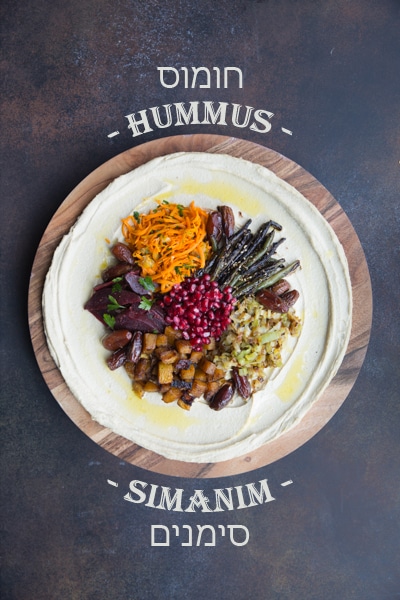
As the New Year approaches, I always like to evaluate where I stand and think about what changes I want to make for myself in the coming year, both personally and professionally. For years, my goal was to take the necessary steps towards writing my own cookbook, and now that I have met that goal (far beyond my expectations, with our first printing of 15,000 books completely sold out in just 3 months!), I keep asking myself, “What’s next?”.
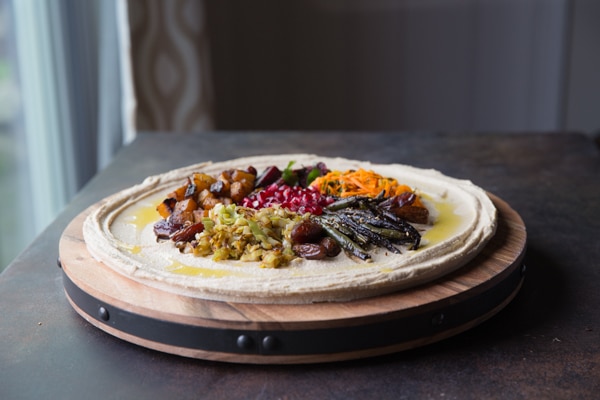
I’m not the type of person that settles on status quo – I’m always dreaming up the next big thing and finding ways to challenge myself. It’s like they say – “If you’re not moving forward, you’re falling behind” – and I definitely believe in that.
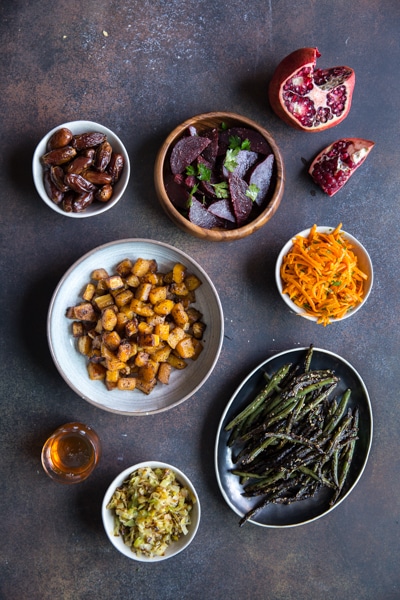
Truth be told, once the book went to print, I was so emotionally and physically exhausted that I couldn’t imagine coming up with new recipes and ideas ever again! But as my workload lightened up this summer, I got back in the kitchen because I wanted to, not because I had to, and I found my groove again! I went back to my roots, the foods and the flavors that I love the most (yes, that means Israeli food!) and this amazing new recipe came to me! It’s simanim on steroids and it is everything you’ve ever dreamed of for your Rosh Hashanah table and more!
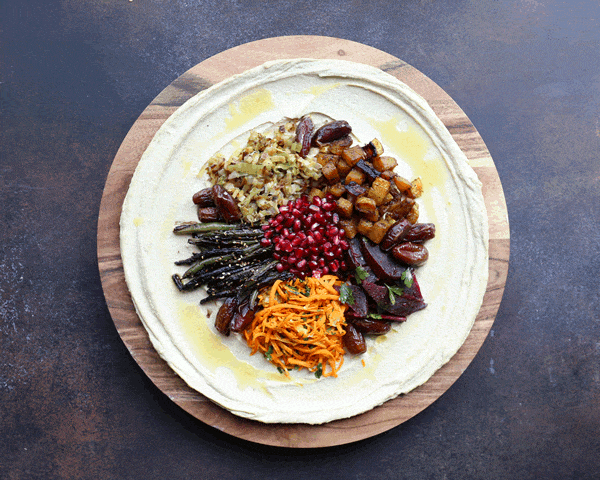
Simanim, or symbolic foods, are traditionally eaten on Rosh Hashanah to symbolize our hopes for a sweet New Year. Some simanim include leeks, pomegranate, gourds (any type of squash), dates, black eyed peas or green beans, beets, carrots and fish head (some use ram’s head). These specific foods are eaten because their hebrew translation relates to specific blessings that convey our wishes for the coming year.
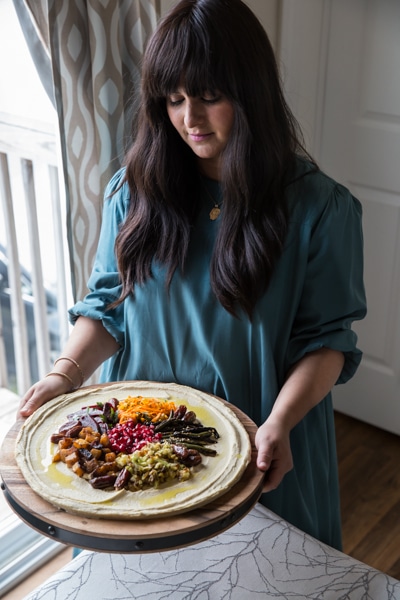
When I put the platter together, I couldn’t stop taking photos because, I mean, HOW GORGEOUS IS IT, amiright??? I all but maxed out my SD card and went. to. town. (No- I like seriously went to town, for some fresh pita!). I invited my neighbors over and we stood over my kitchen counter in the mountains, scooping hummus and salad onto blistered bread, the tastes of Israel growing stronger with each bite. It was a simple dish, but it captured everything I love about what I do – channeling my creativity, sharing with friends, cooking with color and putting a twist on tradition.
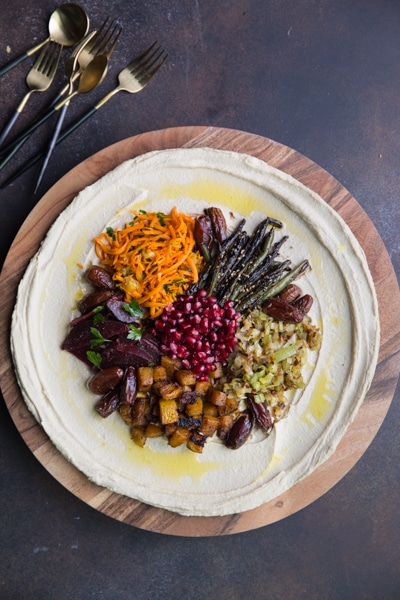
This dish reminded me how important it is to cook from a place of love – it is, after all, the secret ingredient that makes everything taste better – and that it’s food, family and tradition that brings us all together.
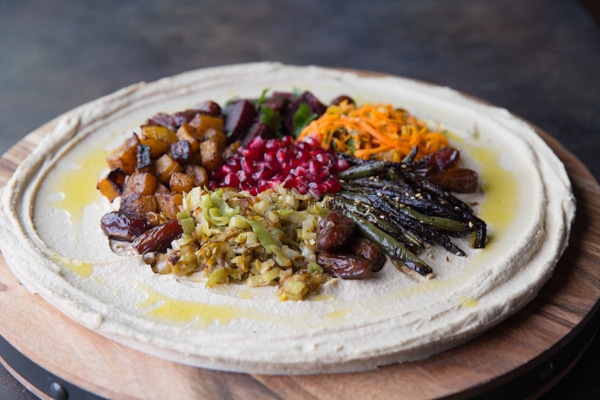
Wishing you all a healthy, happy and sweet New Year with much success in all areas of your lives. May we continue to reach milestones and share good news with each other this year!
Ksiva Vachasima Tova L’shana Tova Umisukah!
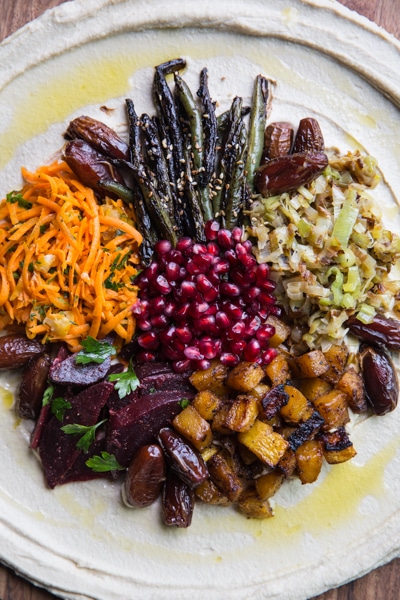
Hummus
2 cloves garlic
¼ cup + 1 Tbsp fresh squeezed lemon juice
2 tsp kosher salt
½ tsp cumin
1 cup good-quality tahini paste, stir if separated
3/4 cup ice water
2 cans chickpeas, rinsed and drained
Add garlic, lemon juice, salt, cumin, and tahini to the bowl of a food processor fitted with the “S” blade. Puree the mixture; while the machine is running, pour ice water through the feed tube. Blend until mixture is very smooth. Add chickpeas; blend until creamy. Adjust seasoning, adding more salt, cumin, or lemon, if desired. To adjust consistency, add a bit of water at a time until desired thickness is achieved.
To assemble the platter: spread the hummus over a large lazy Susan or a shallow bowl. Place mounds of pomegranate blistered green beans, preserved lemon carrot slaw, beet salad, baharat roasted squash, sauteed leeks and pomegranate seeds in the center of the hummus. Add a few pitted dates. Drizzle olive oil over the hummus and serve.
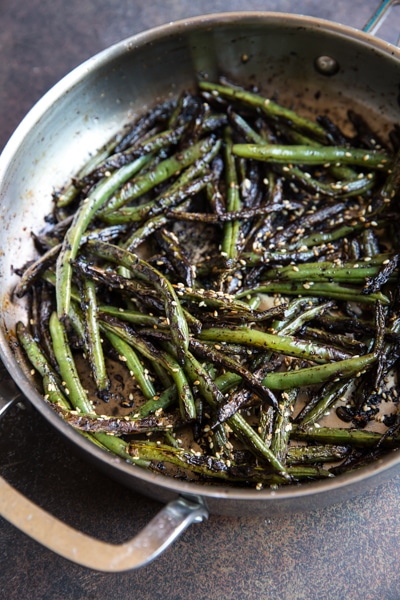
Pomegranate Blistered Green Beans
1 lb green beans, trimmed
1 1/2 tbsp grapeseed oil
2 cloves garlic, minced
1 tbsp pomegranate molasses
salt and pepper, to taste
1 tsp toasted sesame seeds
Method:
Heat the oil in a wok or skillet. Add the green beans and saute over high heat for 4-5 minutes, or until tender-crisp and blistered. Lower the heat, stir in the garlic and saute until softened. Add the pomegranate molasses, salt, pepper and sesame seeds and toss until coated.
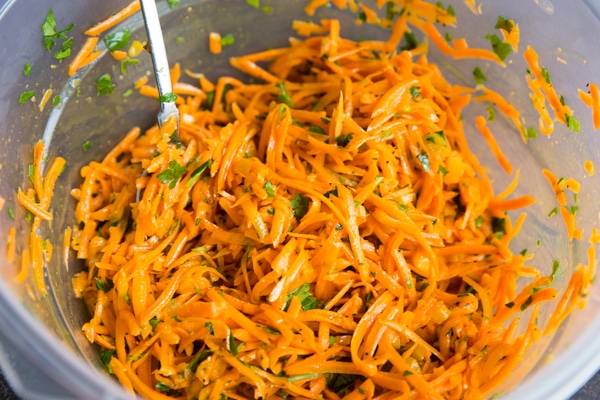
Preserved Lemon Carrot Slaw
reprinted from Millennial Kosher
1 clove garlic, minced
¼ cup light olive oil
3 Tbsp minced preserved lemons
salt and pepper, to taste
3 medium carrots, peeled and grated
¼ cup packed parsley, roughly chopped
Method:
Add garlic, olive oil, preserved lemons, salt and pepper to a bowl; stir to combine. Pour mixture over grated carrots; stir in the parsley.
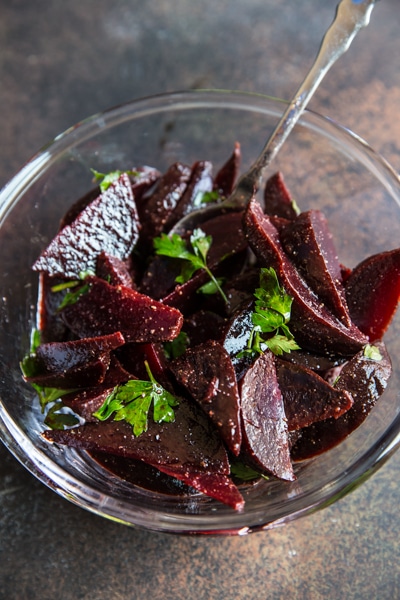
1 lb. roasted or prepared beets, cut into wedges
1 tbsp olive oil
juice of 1/2 lemon
1/2 tsp cumin
salt and pepper, to taste
handful of parsley, roughly chopped
Combine all the ingredients in a bowl and stir to coat.
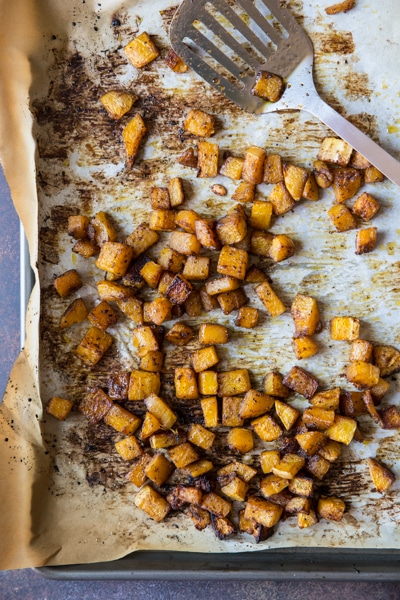
Baharat Roasted Squash
small butternut squash, peeled and diced
2 tbsp olive oil
2 tsp baharat
1 tbsp honey
kosher salt, to taste
Method:
Preheat oven to 425 degrees. Place the butternut squash on a parchment lined baking sheet and add olive oil, baharat, honey and salt, stir to coat. Roast for 30 minutes, stirring occasionally.
Baharat recipe: combine 1 tbsp black pepper, 1 tbsp paprika, 2 1/4 tsp cumin, 1 1/2 tsp coriander, 1 1/2 tsp cinnamon, 1 1/2 tsp cloves, 1/2 tsp nutmeg and 1/4 tsp cardamom.
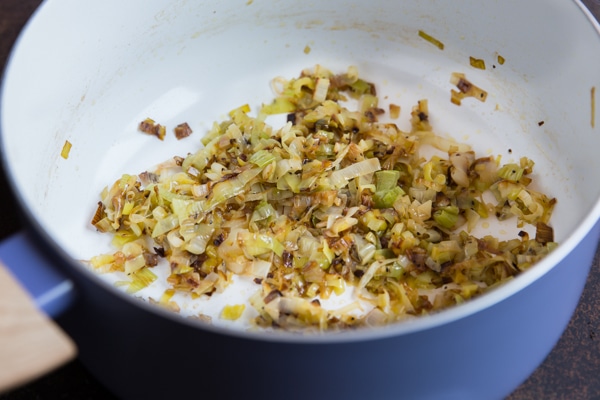
2 leeks
2 tbsp olive oil
salt and pepper, to taste
Cut off the upper portion of the leeks, keeping the white and pale green portion at the bottom. Chop the leeks. Heat the olive oil in a skillet and add the leeks. Saute until caramelized and season to taste, with salt and pepper.
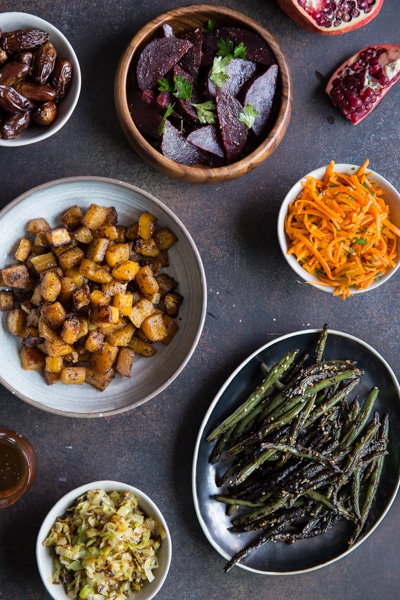
Related Recipes:
simanim fritto misto
simanim pasta salad
simanim holiday salad
hummus bassar
chestnut hummus

This looks amazing!
I am planning to make several platters like this for my family’s table.
I’m happy to hear that!
Hi. I was just wondering what’s preserved lemons? Sorry if it’s a dumb question
It’s lemons that have been preserved in salt. They add a concentrated lemon flavor and they’re used a lot in Moroccan cuisine.
Looks stunning. Can’t wait to try it for Rosh Hashanah. Can I make everything a day in advance and assemble it right before serving?
Sorry I missed this but you definitely can prep all the components in advance.
is there a substitute for the pomegranate molasses? also can you buy the pomegranate molasses somewhere?
There isn’t really. I use Sadaf pomegranate concentrate. It’s available in Middle Eastern markets or on Amazon.
hey Chanie! long-time reader, first-time poster — I’m making this for RH lunch! posted a pic (in process) on my insta — rebex.rose. thanks for the great idea!!
Welcome Rebecca! Thanks so much for sharing and posting! I’m so glad you liked it!
I’ve made this twice this week. It looked magnificent on my table and my guests were very impressed.
I’m so happy to hear that!
How can it be that I only returned from Israel two days ago and I am already longing to return. I have landed at your gorgeously written and photographed blog. This recipe looks just the thing to serve to my friends this summer when I want to introduce them to the tastes and textures of middle eastern cuisine. Thank you!
Welcome to the blog Johanne. There really is nothing in the world like Israel. My heart is always yearning to return!
I love the idea of using a lazy Susan for this! How big was the one you used? Do you remember where you bought it?
Thank you for all these great Rosh Hashana simanim ideas! I am always scrambling at the last minute to think of things. Now just please think of something creative for that fish head…
Hi! The one I used was pretty large, but you can probably go a bit smaller. I bought it at Homegoods!
Hi this looks beautiful! What brand(s) of tahini do you recommend?
I like Al Arz.
I see you list green beans with dates. My hebrew isn’t that great. What is the explanation for them instead of dates?
The green beans and dates are both separate symbolic foods.
Dates, תמרים, are related to the word תם—to end and we say “May it be Your will, Lord our G‑d and the G‑d of our fathers, that there come an end to our enemies, haters and those who wish evil upon us.”
Small beans, רוביא—לוביא, are related to the words, רב—many, and לב—heart. Black eyed peas are traditional but some use green beans instead. We say “May it be Your will, Lord our G‑d and the G‑d of our fathers, that our merits shall increase and that You hearten us.”
We really liked the concept it was a nice variety to the usual simanim I make
Do you have a recipe for the preserved lemons?
Yes, in my cookbook!